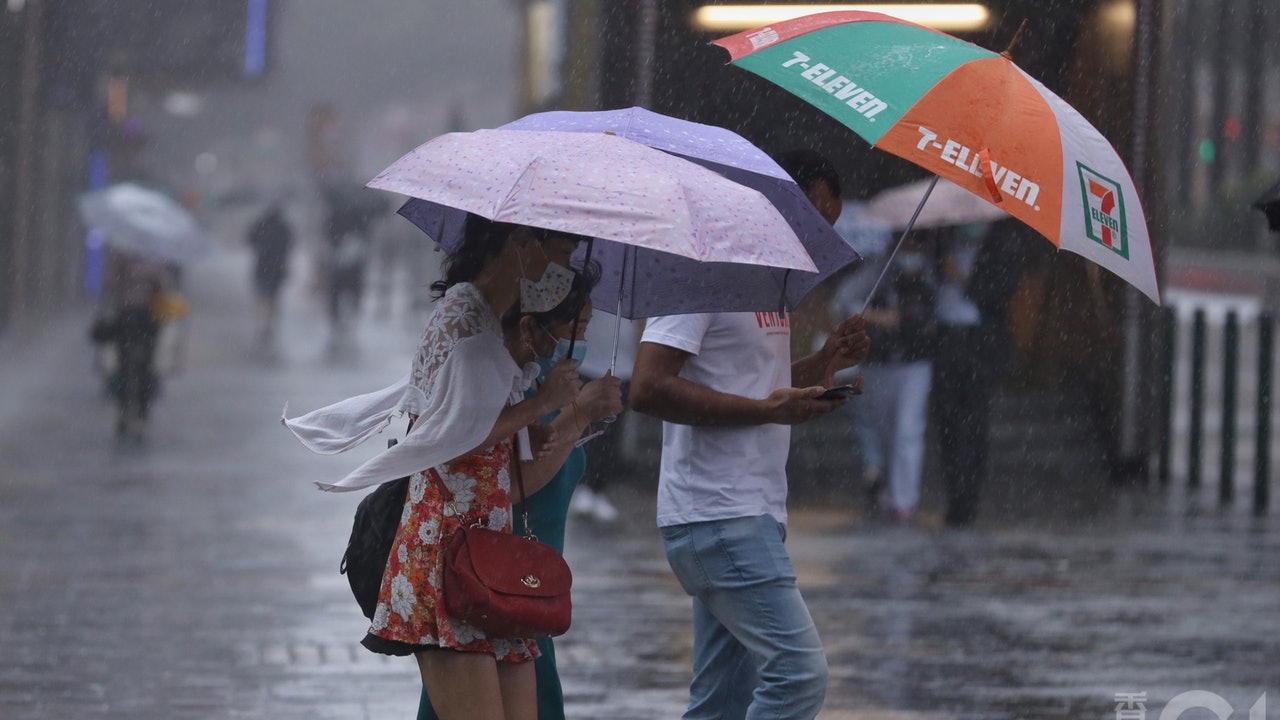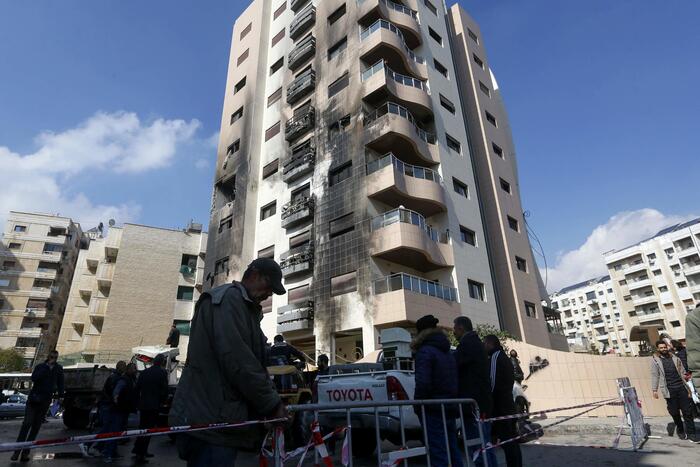In the first two autumns in October, the "Lion Rock" and "Compasses" ordered the Hong Kong Observatory to issue the farthest typhoon signal No. 8 and two typhoon signal No. 8 in the shortest time interval. This disrupted public plans and caused inconvenience. , Also brought a test to the observatory.
What's more, a female worker was unfortunately killed in a scaffold collapse accident at Happy Valley at 10 am on October 8, which made the Observatory questioned whether it should issue a higher-level typhoon and rainstorm warning signal earlier.
On October 15th, "Hong Kong 01" published a long essay of over 5,000 words entitled "Severe Weather-Why Should the Government Put the Observatory under the Pressure of "Rewashing"?" , The responsibilities of other government departments, and whether the Observatory should be transferred from the Bureau of Commerce and Economic Development.
I served as the director of the Hong Kong Observatory for nearly nine years from 2011 to 2020. I have dealt with 3 typhoon signals No. 10. Of course I feel the same as the situation faced by the Observatory this time. In principle, during the whole process, I did not interview at the invitation of the media. Only when I saw the article "Hong Kong 01" which was quite in-depth and rationally discussed. , To facilitate the people concerned to think about problems.
My heartfelt thanks to "Hong Kong 01" for supporting the publication of this article.
Written by: Shun Zhiming (Head of Front Office, Hong Kong Observatory)
Shum Chi Ming served as Director of the Hong Kong Observatory from 2011 to 2020.
(Information Picture/Photographed by Lu Yiming)
Are the warning signals issued by the Observatory appropriate?
Keep in mind that "it is not in its place and does not seek its own politics." I will not analyze and comment on the technical operation of the observatory in detail, but it must be pointed out that the weather warning can play a preset effect, in order to make all citizens take action in response to the warning, and auspicious. To avoid the evil, you need to find a balance in the uncertain prediction: it can be released early without the problem of "the wolf is coming".
Therefore, the Observatory has continuously explained why rainstorm warnings, especially red and black warnings, cannot be issued several hours earlier, while typhoon warnings can be issued several hours earlier in most cases.
I still remember that shortly after taking office as the director in 2011, I said in response to the media that we would issue an early warning as early as possible, but there will always be "unpredictable circumstances". Under certain circumstances, we will never be able to do this, and we will never predict. It will be 100% accurate. When these unsatisfactory situations occur, please forgive me.
Ten years have passed. Although there have been some "unsatisfactory situations" during my tenure, after working hard to communicate with the public, and even interacting and commenting with citizens and weather enthusiasts on my own social media accounts, I can always save the society. I will also be more forgiving and considerate about the observatory’s non-sleeping and dedicated work attitude.
I deeply appreciate the importance of maintaining direct communication with the public.
How to use appropriate language to express the uncertainty in weather forecasts and warnings is indeed an old problem.
When I was in office, I invited friends from the media, academics, and retired officials to provide advice on the wording of weather drafts for the Observatory, and made some improvements.
For example, using such words "unless XX takes a path closer to Hong Kong or significantly increases, there is little chance of sending a higher signal today" to deal with some uncertain situations.
However, for some more certain situations, clear information will be used as much as possible. For example, when dealing with "mangosteen", the Observatory said: "The No. 8 gale or storm signal will be issued around midnight."
The words used must reflect the actual situation at the time, especially the uncertainty of the forecast.
Severe damage caused by the super typhoon "Mangkhut".
(Image source: Cen Zhiming)
As for the tragedy of the scaffold collapse, some friends in the construction industry told me that the Labour Department has a safety code for scaffold safety, which clearly states: "When considering the wind load on the scaffold, you should refer to the issue issued by the Buildings Department. "Hong Kong Code of Practice for Wind Effects." As far as I know, this code applies to building structures and can withstand wind speeds equivalent to the power of the 1962 typhoon "Wandai".
Since only strong winds were generally blowing in various districts of Hong Kong on October 8, the scaffolding should not collapse in its entirety.
Experience also tells us that in the past when Typhoon Signal No. 3 was in effect, accidents of scaffolding collapsed, but the collapse of the entire scaffolding was quite rare.
It is self-evident whether the observatory is responsible for the collapse of the scaffold.
Responsibilities of other government departments?
"Hong Kong 01" pointed out in the article that in addition to the Hong Kong Observatory, other relevant government departments have their own responsibilities.
I still remember that in the process of handling the super typhoon "Mangkhut", the Observatory continued to communicate with relevant departments to support their decision-making.
A good example of this is that after consulting the Observatory, the Education Bureau has been able to decide on September 15th (Saturday) that all schools will be 1) Suspension of classes without waiting for the observatory to remove the 8 typhoon signals on that day.
Checking the Observatory’s records, the rainbands on the "Lion Rock" had already begun to affect Hong Kong on the evening of October 7. The yellow rainstorm warning signal was issued at 11:20 in the evening. After that, the heavy rain was intermittent and was issued at 4:40 in the morning on October 8. The strong wind signal replaced the strong monsoon signal, and a landslide warning was issued at 9:50 in the morning, and the situation quickly deteriorated. The special report on flooding in the northern New Territories, the red and black rainstorm warning signals were issued at 10:20 and 11:20 respectively in the morning. And 11:45.
It can be seen that severe weather warnings have been issued one after another. In the worst case, 4 different warnings will be effective at the same time.
The question is: Can the decision-making authority make a decision to suspend work and class before students and citizens go out?
Frankly speaking, quite difficult!
Generally speaking, relevant announcements need to be issued before the students go out, but the only warnings that are effective from 5 am to 6 am that day are the strong wind signal No. 3 and the yellow rainstorm warning signal. The rain area affecting Hong Kong is relatively weak
(picture below)
.
If we want to decide to suspend classes based on these two superimposed signals alone, we need to refer to past statistics to see if this situation will be too much?
Has this situation ever affected students' attendance and dismissal of classes or school operations?
Does the society accept it?
Radar image at 6 am on October 8, 2021 (Photo source: Hong Kong Observatory)
In recent years, the World Meteorological Organization has encouraged member states to develop "Multi-hazard (Impact-based) forecast and early warning services". The purpose is to deal with the above problems and raise awareness of the potential impact of meteorological disasters. .
This requires the Observatory and its partner agencies, especially the disaster reduction and civil defense agencies, to work closely together to collect relevant data and carry out "exposure" (for example: whether high winds, heavy rains, flooding or landslides will occur when the students are in and out of class Emergence) and “vulnerability” (for example: the potential impact of high winds, heavy rains, flooding or landslides on students or schools).
As the Observatory does not have complete control of relevant data (for example, real-time flooding and landslide data), it must cooperate with relevant departments and partner agencies to jointly develop early warning indicators and service mechanisms to address the risks caused by severe weather (in simple terms) Say: risk = disaster x exposure x vulnerability) reduction.
Should the Observatory be transferred from the Bureau of Commerce and Economics?
Recently, some political parties and legislators proposed to transfer the Hong Kong Observatory from the "Commerce and Economic Development Bureau" (Bureau of Commerce and Economic Development) to the Environment Bureau.
After "Lion Rock" and "Compass", similar sounds became even worse.
The Observatory's subordination to the Bureau of Commerce and Economics has historical reasons. At the beginning of its establishment, it mainly served the shipping industry. After the rapid development of the aviation industry in the 20th century, serving the aviation industry has become another focus of the Observatory.
In fact, some established meteorological offices around the world, such as the British Meteorological Agency under the Department of Commercial Energy and Industrial Strategy, the US National Oceanic and Atmospheric Administration under the Ministry of Commerce, the German Meteorological Agency under the Federal Ministry of Transport and Digital Infrastructure, and the French Meteorological Agency under the Ecological Transition The Ministry and the China Meteorological Administration are institutions directly under the State Council. Except for the French Meteorological Administration, they belong to the fields of commerce, industry, transportation or digital technology, and even directly under the highest administrative agency.
Some people think that the Hong Kong Observatory should be assigned to the Environment Bureau, just because the Environment Bureau is responsible for policies related to climate change.
In fact, the main scope of work of the Hong Kong Observatory is weather forecasting and warning services, providing 24-hour uninterrupted services to the public, aviation, shipping and other special users.
The Observatory is also responsible for monitoring other disasters, including earthquakes, tsunamis, nuclear radiation, etc., and supports the "Natural Disaster Contingency Plan" and "Daya Bay Contingency Plan" of the Security Bureau.
The work on climate change is only a small part, accounting for less than 10% of the work of the entire department. It is not logical to assign it to the Environment Bureau.
As far as the nature of work is concerned, most of the observatory’s tasks are business tasks, such as: issuing weather warnings, airport windshear warnings, earthquake early warnings and other real-time operations to ensure life safety and reduce property losses, while climate change focuses on decades of long-term The changes and response plans are very different from the observatory’s race against time business operations.
Moreover, the Observatory’s climate change work only provides relevant scientific data and public education to the Environment Bureau and other policy bureaus and departments, and has never directly participated in the formulation of climate change policies.
As for the nonsense of the so-called "Li's force field" in the market for many years, some people have also proposed that it is the reason why the Hong Kong Observatory should leave the Bureau of Commerce and Economics to avoid negative public perception.
In fact, in addition to the fact that the Secretary for Commerce and Economic Affairs has recently explicitly denied it, I have never received instructions from the Bureau of Commerce and Economic Affairs or its superiors during my 34 years of career at the Hong Kong Observatory, including nearly nine years as the director. When to issue or not issue the typhoon.
The Observatory will only deal with typhoon and other warnings based on "science-based and public safety as the primary consideration". This scientific principle is well known by the observatory, and it has become a training (pictured below).
The public's trust in the Observatory also stems from their belief that she adheres to scientific principles.
On the contrary, if the Observatory is transferred to the Environment Bureau, since "environment" is always involved in values and social politics, will it be questioned whether the Observatory's operation is more affected by external factors and become "unscientific"?
The core values of the Hong Kong Observatory are based on SCIENCE.
Concluding remarks
In short, I hope that the Hong Kong Observatory can learn from the two "autumn observatories" this time, sum up experience, further improve weather forecasting technology and public communication, and strengthen cooperation with other relevant departments to promote "multi-hazard impact-based forecasting." The development of "and early warning service" issues weather warnings that are more suitable for different user groups, and enhances the disaster prevention and mitigation capabilities of Hong Kong as a whole society.
As for the question of whether to "transfer", I think that the necessity and urgency are not visible at present, and it is better to remain silent.
Ask the community to give the Hong Kong Observatory a space to continue to use the "science-based" institutional culture it has established over 130 years, and continue to apply innovative technologies to improve forecasts and services, cope with the more extreme weather in the future, and protect Hong Kong with science.
This will be the blessing of Hong Kong and the people.
Severe Weather | Why does the government put the Observatory under the pressure of being "washed"?
Lam Cheng took the initiative to raise the issue of the observatory’s typhoon signal: the information dissemination has room to improve the typhoon|Yu Tenghua: No participation in the observatory’s decision does not involve economic factors Because it affects the economy?





/cloudfront-eu-central-1.images.arcpublishing.com/prisa/JA4RXYZUW5B6ZAE3MS46WDSQP4.jpg)









